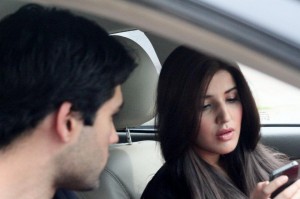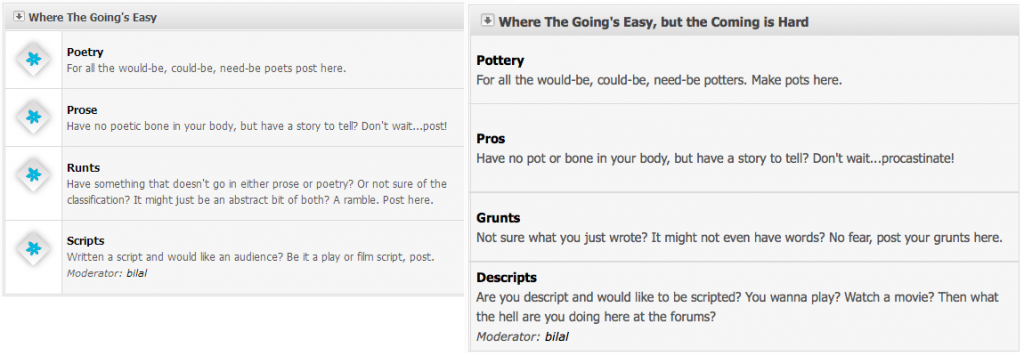Siyaah, an independent horror film produced by Imran Raza Kazmi and directed by Azfar Jafri, recently hit cinemas nationwide. Farheen Zehra got together for a quick Q&A with resident DWLer Osman Khalid Butt, who wrote the screenplay for the film.
FZ: So, a horror story screenplay. How did this happen?
OKB: I’d previously written several scripts [both short and long format] for theatre and had been adapting scripts for stage since my directorial debut Some Like it Hot back in 2007. I’d always wanted to write for film but our industry was ruled by the whims of a gandaasa and an electrocuted bosom, and my Punjabi was reserved to the odd off-color joke copied from desi dubbings of Hollywood movies [see: The Amazing Spiderman]. Recently, with the growth of the indie film industry, opportunities began arising, specifically with short films. In  2008, I started writing a series of shorts, beginning with a story called ‘Kalika’, which I’m hoping you’ll see on Facebook/Vimeo soon, Insha’Allah. However, I always found one reason or the other not to put my stuff ‘out there’, share it with other aspiring filmmakers/colleagues or just pick up a camera myself and shoot. I’m grateful Imran Kazmi [the producer of Siyaah] gave me a much-needed kick when he brought the concept of the film and scene breakdown in the winter of ’10.
2008, I started writing a series of shorts, beginning with a story called ‘Kalika’, which I’m hoping you’ll see on Facebook/Vimeo soon, Insha’Allah. However, I always found one reason or the other not to put my stuff ‘out there’, share it with other aspiring filmmakers/colleagues or just pick up a camera myself and shoot. I’m grateful Imran Kazmi [the producer of Siyaah] gave me a much-needed kick when he brought the concept of the film and scene breakdown in the winter of ’10.
Siyaah was conceived by Zahra Zaman Khan and actually went through three to four screenwriters before it came to me. I’ve had an unhealthy obsession with horror ever since Omar Ali Khan, entrepreneur and director of Zibahkhana, lent my brother this B-movie called ‘Tourist Trap’ and the still-effective ‘Candyman’ back when it was still inappropriate for me to be watching horror. So when Imran asked me to expand on the concept of Siyaah and to rewrite its screenplay, I happily agreed, self-doubt for once gleefully thrown out the window. It wasn’t an easy process, mind you: bouts of creativity [or so we thought] were followed by weeks where I couldn’t write a single dialogue. I began writing the script beginning February, after getting done with prior commitments, and finished mid-July. Imran was with me every step of the way.
FZ: Which genre of horror appeals to you the most? Is it reflected in this script?
OKB: The tension before the reveal, if you will. Where the music – usually discordant violin – reaches a crescendo and then abruptly stops and you think, but not really, that the danger just might be over. The King of the genre [forgive the bad pun] spoke of terror and its types. Being a huge fan ever since I read ‘It‘, there were moments in the script where I tried to terrorize viewers with what I wrote: specifically with the fear and guilt carried by the principal character, Zara [played by Hareem Farooq], with those instances where Natasha  gave that all-knowing smile and you knew she was plotting something terrifying – that edge-of-your-seat suspense. But there were also moments of horror, like in Natasha’s reveal: her brutality… her sheer evil. And of course, there were scenes that employed obvious gimmickry as well: the nods and references to several iconic horror films, pointed dialogue, the occasional slit throat and snakes and bogeymen.
gave that all-knowing smile and you knew she was plotting something terrifying – that edge-of-your-seat suspense. But there were also moments of horror, like in Natasha’s reveal: her brutality… her sheer evil. And of course, there were scenes that employed obvious gimmickry as well: the nods and references to several iconic horror films, pointed dialogue, the occasional slit throat and snakes and bogeymen.
FZ: What aspect of script writing did you find most challenging? What was the process like?
OKB: Procrastination. Had it not been for Imran practically dragging me out of bed, shoving a Red Bull down my throat as he opened up Microsoft Word for me, this script would never have seen the light of day. Also: hitting the proverbial writer’s Great Wall of China.
FZ: Unlike prose, is script writing a more collective effort? At what point did you share your draft with the director?
OKB: Yes, it is and in the case of Siyaah, perhaps even more so. In an industry that’s struggling to find its bearings, and particularly with an indie film, your screenplay does become a collaboration of many minds. For Siyaah, director Azfar Jafri had to improvise with a number of things I’d written. Certain dialogues and situations were changed, including the original ending (which I was aware of and participated in). Then there was the scene where the Pir opens the door to an alternate universe in his attempt to get away from Natasha. That was all Azfar. Improvisation is necessary because there are several constraints that  accompany a filming process here: budget, schedules, timelines, technical support (and also the fact that your screenwriter has written a practically impossible-to-shoot scene where a body falls from the first floor and crash-lands into a windshield, with the principal character inside the car).
accompany a filming process here: budget, schedules, timelines, technical support (and also the fact that your screenwriter has written a practically impossible-to-shoot scene where a body falls from the first floor and crash-lands into a windshield, with the principal character inside the car).
By the time I took on scriptwriting duties for Siyaah, there was an entire plot outline to follow. There were certain elements the producer wanted which I tried to give the old wine/new bottle makeover. Fortunately I was given free rein to construct the sequences, work on character development and present your usual horror-movie tropes in a contextualized, slick, different manner. While writing, I eventually embraced the fact that the movie was essentially a homage to the great horror films, before the gore and torture-porn masquerade started. That’s why you’ll see some subtle, some not-too-subtle pop-culture references thrown in there, including one involving pea soup [The Exorcist]. But mostly, though, it was me sitting in front of my computer, throwing ideas Imran’s way at 3 am whilst staring at a blinking cursor – and then working on constructing said scene when it felt right spoken out loud and envisioned.
 For me, it was very important to have audiences connect with Zara’s character for that much-needed human element: to feel her disconnect and her silent suffering – and her unique relationship with her husband: easygoing on the surface, but quiet tensions simmering nonetheless. Hareem did a great job at peeling through Zara’s different layers and bringing them out. Zara is not just a ‘scream-queen’; she is a fleshed-out character. I’m glad the reviews have reflected that.
For me, it was very important to have audiences connect with Zara’s character for that much-needed human element: to feel her disconnect and her silent suffering – and her unique relationship with her husband: easygoing on the surface, but quiet tensions simmering nonetheless. Hareem did a great job at peeling through Zara’s different layers and bringing them out. Zara is not just a ‘scream-queen’; she is a fleshed-out character. I’m glad the reviews have reflected that.
FZ: Is it safe to label you as a horror film writer or will you venture into other genres?
OKB: Oh, the latter, most definitely. Here at DWL, for example, my poetry and prose has been mostly about the macabre. Come to think of it, two of the four plays I directed under my banner were of the thriller/horror genre [The Good Doctor and Let Me In, the latter based on Stephen King’s novella ‘The Mist’] while the remaining two were musicals [Some Like It Hot and Superstar Avatar]. In the two feature films I’ve acted in, one had me regressing into a zombie and featured my own brand of projectile vomit [Zibahkhana, literally translated as Slaughterhouse]. So it’s safe to say that yes, I am most definitely interested in venturing out.

Osman’s Humsafar parody made him a household name
Comedy is a particular interest. One of the reasons I started video-blogging/performing comedy sketches on YouTube was to test the waters, so to speak; see what brand of humor worked best with viewers. From satire to dry wit to slapstick and the occasional cross-dressing, writing material for my v-logs has been an insane and yet illuminating process.
What I really want to write, and hopefully direct, is a kitschy Bollywood-esque dramedy. Horror might be considered a niche genre, but that’s not the only reason. I’ve said this so many times now it’s going to be written on my gravestone in all-caps, but I’ve grown up on a staple diet of Bollywood. I love the formula: the meet-cute, the music, the choreographed dance sequences, the complications arising smack before interval, the acoustic, stripped-down versions of the title songs for dramatic effect and the eventual happy ending. Feel-good cinema is where my head’s at these days. Actually that’s a lie. It’s been where my head’s at since I was eight.




